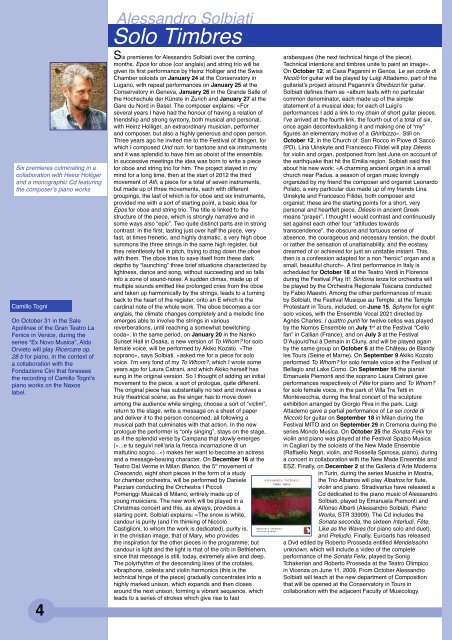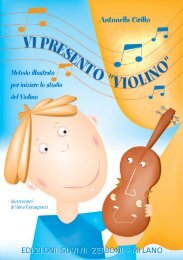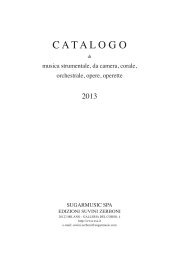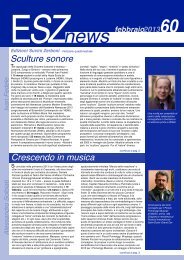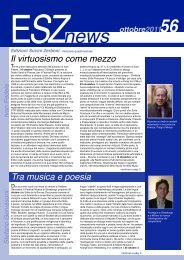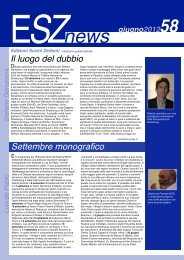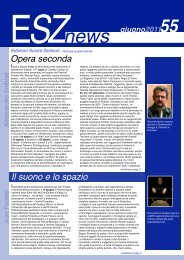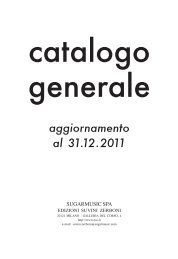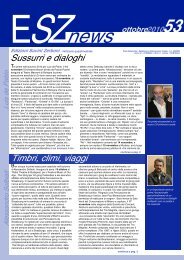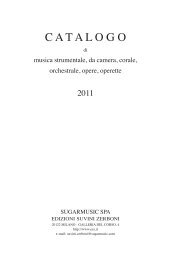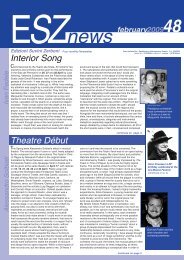Timbral Spaces Sound Labyrinths - Edizioni Suvini Zerboni
Timbral Spaces Sound Labyrinths - Edizioni Suvini Zerboni
Timbral Spaces Sound Labyrinths - Edizioni Suvini Zerboni
You also want an ePaper? Increase the reach of your titles
YUMPU automatically turns print PDFs into web optimized ePapers that Google loves.
Six premieres culminating in a<br />
collaboration with Heinz Holliger<br />
and a monographic Cd featuring<br />
the composer’s piano works<br />
Camillo Togni<br />
On October 31 in the Sale<br />
Apollinee of the Gran Teatro La<br />
Fenice in Venice, during the<br />
series “Ex Novo Musica”, Aldo<br />
Orvieto will play Ricercare op.<br />
28 b for piano, in the context of<br />
a collaboration with the<br />
Fondazione Cini that foresees<br />
the recording of Camillo Togni’s<br />
piano works on the Naxos<br />
label.<br />
4<br />
Alessandro Solbiati<br />
Solo Timbres<br />
S<br />
ix premieres for Alessandro Solbiati over the coming<br />
months. Epos for oboe (cor anglais) and string trio will be<br />
given its first performance by Heinz Holliger and the Swiss<br />
Chamber soloists on January 24 at the Conservatory in<br />
Lugano, with repeat performances on January 25 at the<br />
Conservatory in Geneva, January 26 in the Grande Salle of<br />
the Hochschule der Künste in Zurich and January 27 at the<br />
Gare du Nord in Basel. The composer explains: «For<br />
several years I have had the honour of having a relation of<br />
friendship and strong syntony, both musical and personal,<br />
with Heinz Holliger, an extraordinary musician, performer<br />
and composer, but also a highly generous and open person.<br />
Three years ago he invited me to the Festival of Ittingen, for<br />
which I composed Und nun, for baritone and six instruments<br />
and it was splendid to have him as oboist of the ensemble.<br />
In successive meetings the idea was born to write a piece<br />
for oboe and string trio for him. The project stayed in my<br />
mind for a long time, then at the start of 2012 the third<br />
movement of Alfi, a piece for a total of seven instruments,<br />
but made up of three movements, each with different<br />
groupings, the last of which is for oboe and six instruments,<br />
provided me with a sort of starting point, a basic idea for<br />
Epos for oboe and string trio. The title is linked to the<br />
structure of the piece, which is strongly narrative and in<br />
some ways also “epic”. Two quite distinct parts are in strong<br />
contrast: in the first, lasting just over half the piece, very<br />
fast, at times frenetic, and highly dramatic, a very high oboe<br />
summons the three strings in the same high register, but<br />
they relentlessly fall in pitch, trying to drag down the oboe<br />
with them. The oboe tries to save itself from these dark<br />
depths by “launching” three brief situations characterized by<br />
lightness, dance and song, without succeeding and so falls<br />
into a zone of sound-noise. A sudden climax, made up of<br />
multiple sounds emitted like prolonged cries from the oboe<br />
and taken up harmonically by the strings, leads to a turning<br />
back to the heart of the register, onto an E which is the<br />
cardinal note of the whole work. The oboe becomes a cor<br />
anglais, the climate changes completely and a melodic line<br />
emerges able to involve the strings in various<br />
reverberations, until reaching a somewhat bewitching<br />
coda». In the same period, on January 20 in the Nanko<br />
Sunset Hall in Osaka, a new version of To Whom? for solo<br />
female voice, will be performed by Akiko Kozato. «The<br />
soprano», says Solbiati, «asked me for a piece for solo<br />
voice. I’m very fond of my To Whom?, which I wrote some<br />
years ago for Laura Catrani, and which Akiko herself has<br />
sung in the original version. So I thought of adding an initial<br />
movement to the piece, a sort of prologue, quite different.<br />
The original piece has substantially no text and involves a<br />
truly theatrical scene, as the singer has to move down<br />
among the audience while singing, choose a sort of “victim”,<br />
return to the stage, write a message on a sheet of paper<br />
and deliver it to the person concerned, all following a<br />
musical path that culminates with that action. In the new<br />
prologue the performer is “only singing”, stays on the stage,<br />
as if the splendid verse by Campana that slowly emerges<br />
(«...e tu seguivi nell’aria la fresca incarnazione di un<br />
mattutino sogno...») makes her want to become an actress<br />
and a message-bearing character. On December 16 at the<br />
Teatro Dal Verme in Milan Bianco, the 5th movement of<br />
Crescendo, eight short pieces in the form of a study<br />
for chamber orchestra, will be performed by Daniele<br />
Parziani conducting the Orchestra I Piccoli<br />
Pomeriggi Musicali di Milano, entirely made up of<br />
young musicians. The new work will be played in a<br />
Christmas concert and this, as always, provides a<br />
starting point. Solbiati explains: «The snow is white,<br />
candour is purity (and I’m thinking of Niccolò<br />
Castiglioni, to whom the work is dedicated), purity is,<br />
in the christian image, that of Mary, who provides<br />
the inspiration for the other pieces in the programme; but<br />
candour is light and the light is that of the crib in Bethlehem,<br />
since that message is still, today, extremely alive and deep.<br />
The polyrhythm of the descending lines of the crotales,<br />
vibraphone, celesta and violin harmonics (this is the<br />
technical hinge of the piece) gradually concentrates into a<br />
highly marked unison, which expands and then closes<br />
around the next unison, forming a vibrant sequence, which<br />
leads to a series of strokes which give rise to fast<br />
arabesques (the next technical hinge of the piece).<br />
Technical intentions and timbres unite to paint an image».<br />
On October 12, at Casa Paganini in Genoa, Le sei corde di<br />
Nicolò for guitar will be played by Luigi Attademo, part of the<br />
guitarist’s project around Paganini’s Ghiribizzi for guitar.<br />
Solbiati defines them as «album leafs with no particular<br />
common denominator, each made up of the simple<br />
statement of a musical idea; for each of Luigi’s<br />
performances I add a link to my chain of short guitar pieces.<br />
I’ve arrived at the fourth link, the fourth out of a total of six,<br />
once again decontextualizing it and making one of “my”<br />
figures an elementary motive of a Ghiribizzo». Still on<br />
October 12, in the Church of San Rocco in Piove di Sacco<br />
(PD), Lina Uinskyte and Francesco Filidei will play Déesis<br />
for violin and organ, postponed from last June on account of<br />
the earthquake that hit the Emilia region. Solbiati said this<br />
about his new work: «A charming ancient organ in a small<br />
church near Padua, a season of organ music lovingly<br />
organized by my friend the composer and organist Leonardo<br />
Polato, a very particular duo made up of my friends Lina<br />
Uinskyte and Francesco Filidei, both composer and<br />
organist: these are the starting points for a short, very<br />
personal and heartfelt piece. Déesis in ancient Greek<br />
means “prayer”. I thought I would contrast and continuously<br />
set against each other four “attitudes towards<br />
transcendence”, the obscure and tortuous sense of<br />
absence, the courageous and necessary tension, the doubt<br />
or rather the sensation of unattainability, and the ecstasy<br />
dreamed of or achieved for just an unstable instant. This,<br />
then is a confession adapted for a non “heroic” organ and a<br />
small, beautiful church». A first performance in Italy is<br />
scheduled for October 18 at the Teatro Verdi in Florence<br />
during the Festival Play It!: Sinfonia terza for orchestra will<br />
be played by the Orchestra Regionale Toscana conducted<br />
by Fabio Maestri. Among the other performances of music<br />
by Solbiati, the Festival Musique au Temple, at the Temple<br />
Protestant in Tours, included, on June 15, Sphynx for eight<br />
solo voices, with the Ensemble Vocal 2021 directed by<br />
Agnès Charles. I quattro punti for twelve cellos was played<br />
by the Nomos Ensemble on July 1 st at the Festival “Cello<br />
fan” in Callian (France), and on July 3 at the Festival<br />
D’Aujourd’hui à Demain in Cluny, and will be played again<br />
by the same group on October 6 at the Château de Blandy<br />
les Tours (Seine et Marne). On September 9 Akiko Kozato<br />
performed To Whom? for solo female voice at the Festival of<br />
Bellagio and Lake Como. On September 16 the pianist<br />
Emanuela Piemonti and the soprano Laura Catrani gave<br />
performances respectively of Fête for piano and To Whom?<br />
for solo female voice, in the park of Villa Tre Tetti in<br />
Montevecchia, during the final concert of the sculpture<br />
exhibition arranged by Giorgio Riva in the park. Luigi<br />
Attademo gave a partial performance of Le sei corde di<br />
Niccolò for guitar on September 18 in Milan during the<br />
Festival MITO and on September 29 in Cremona during the<br />
series Mondo Musica. On October 25 the Sonata Felix for<br />
violin and piano was played at the Festival Spazio Musica<br />
in Cagliari by the soloists of the New Made Ensemble<br />
(Raffaello Negri, violin, and Rossella Spinosa, piano), during<br />
a concert in collaboration with the New Made Ensemble and<br />
ESZ. Finally, on December 2 at the Galleria d’Arte Moderna<br />
in Turin, during the series Musiche in Mostra,<br />
the Trio Albatros will play Albatros for flute,<br />
violin and piano. Stradivarius have released a<br />
Cd dedicated to the piano music of Alessandro<br />
Solbiati, played by Emanuela Piemonti and<br />
Alfonso Alberti (Alessandro Solbiati, Piano<br />
Works, STR 33909). The Cd includes the<br />
Sonata seconda, the sixteen Interludi, Fête,<br />
Like as the Waves (for piano solo and duet),<br />
and Preludio. Finally, Euroarts has released<br />
a Dvd edited by Roberto Prosseda entitled Mendelssohn<br />
unknown, which will include a video of the complete<br />
performance of the Sonata Felix, played by Sonig<br />
Tchakerian and Roberto Prosseda at the Teatro Olimpico<br />
in Vicenza on June 11, 2009. From October Alessandro<br />
Solbiati will teach at the new department of Composition<br />
that will be opened at the Conservatory in Tours in<br />
collaboration with the adjacent Faculty of Musicology.


